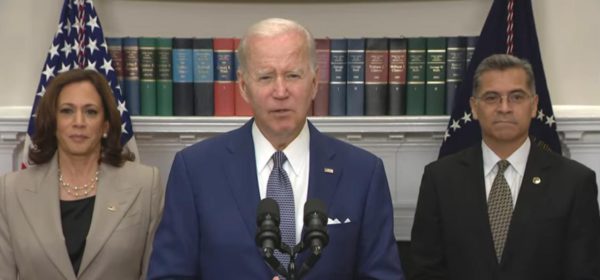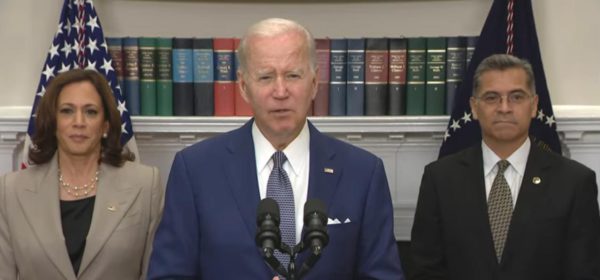President Biden on Friday signed an executive order protecting access to reproductive health care services.
The president is under pressure from Democrats to step-up actions in the wake of the U.S. Supreme Court decision that overturned Roe v. Wade.
Biden made it clear that Congress needs to codify reproductive healthcare choices, however he also stated that he would continue to take actions on his own to to defend reproductive rights and protect access to safe and legal abortion.
Flanked by Vice President Kamala Harris and Health and Human Services Secretary Xavier Becerra in the Roosevelt Room, the president spoke about the order and the circumstances leading to the need for the executive order.
Biden referring to the Supreme Court ruling as “the wrong headed decision,” castigated the court for “playing fast and loose with the facts,” using the argument that abortion wasn’t rooted in historical precedent.
“The Supreme Court in Dobbs made a terrible, extreme and I think totally wrong-headed decision to overturn Roe v. Wade … This was not a decision driven by the Constitution […or] by history,” he said.
Biden then criticized the majority for reading the Constitution as frozen in the mindset of the 1800s, when women didn’t even have the right to vote.
Quoting the justice in dissent he then noted that the court decision was use of raw political power, saying that the court had finally a conservative majority to walk back the decision.
Biden urged that voters push out the Republicans in the upcoming mid-term elections labeling the Republicans as “extremist.” He then angrily cited the recent example of the 10-year-old rape victim in Ohio who was forced to travel to neighboring Indiana to have an abortion.
“Ten years old! … A 10 year old girl should be forced to give birth to a rapist’s child? What could be more extreme,” Biden said.
He warned that extremist Republicans even want to impose a national ban on abortion. As long as he’s president such a bill would be vetoed, he said.
The president also specified the need to have the Federal Trade Commission to regulate data brokers and others to enforce privacy for people using apps that expose them to the transfer and sales of sensitive health-related data.

(Screenshot/YouTube White House Channel)
Biden then outlined that the Executive Order included:
- Safeguarding access to reproductive health care services, including abortion and contraception;
- Protecting the privacy of patients and their access to accurate information;
- Promoting the safety and security of patients, providers, and clinics; and
- Coordinating the implementation of Federal efforts to protect reproductive rights and access to health care.
The White House released the language of the executive order prior to Biden signing it:
The president has directed the secretary of Health and Human Services (HHS) to take the following actions and submit a report to him within 30 days on efforts to:
- Protect Access to Medication Abortion. HHS will take additional action to protect and expand access to abortion care, including access to medication that the FDA approved as safe and effective over 20 years ago. These actions will build on the steps the secretary of HHS has already taken at the president’s direction following the decision to ensure that medication abortion is as widely accessible as possible.
- Ensure Emergency Medical Care. HHS will take steps to ensure all patients – including pregnant women and those experiencing pregnancy loss – have access to the full rights and protections for emergency medical care afforded under the law, including by considering updates to current guidance that clarify physician responsibilities and protections under the Emergency Medical Treatment and Labor Act (EMTALA).
- Protect Access to Contraception. HHS will take additional actions to expand access to the full range of reproductive health services, including family planning services and providers, such as access to emergency contraception and long-acting reversible contraception like intrauterine devices (IUDs). In all 50 states and the District of Columbia, the Affordable Care Act guarantees coverage of women’s preventive services, including free birth control and contraceptive counseling, for individuals and covered dependents. The secretary of HHS has already directed the Centers for Medicare and Medicaid Services to take every legally available step to ensure patient access to family planning care and to protect family planning providers.
- Launch Outreach and Public Education Efforts. HHS will increase outreach and public education efforts regarding access to reproductive health care services — including abortion — to ensure that Americans have access to reliable and accurate information about their rights and access to care.
- Convene Volunteer Lawyers. The attorney general and the White House counsel will convene private pro bono attorneys, bar associations, and public interest organizations to encourage robust legal representation of patients, providers, and third parties lawfully seeking or offering reproductive health care services throughout the country. Such representation could include protecting the right to travel out of state to seek medical care. Immediately following the Supreme Court decision, the president announced his administration’s position that Americans must remain free to travel safely to another state to seek the care they need, as the attorney general made clear in his statement, and his commitment to fighting any attack by a state or local official who attempts to interfere with women exercising this right.
PROTECTING PATIENT PRIVACY AND ACCESS TO ACCURATE INFORMATION
The president’s executive order takes additional steps to protect patient privacy, including by addressing the transfer and sales of sensitive health-related data, combatting digital surveillance related to reproductive health care services, and protecting people seeking reproductive health care from inaccurate information, fraudulent schemes, or deceptive practices. The executive order will:
- Protect Consumers from Privacy Violations and Fraudulent and Deceptive Practices. The president has asked the chair of the Federal Trade Commission to consider taking steps to protect consumers’ privacy when seeking information about and provision of reproductive health care services. The president also has directed the secretary of HHS, in consultation with the attorney general and chair of the FTC, to consider options to address deceptive or fraudulent practices, including online, and protect access to accurate information.
- Protect Sensitive Health Information. HHS will consider additional actions, including under the Health Insurance Portability and Accountability Act (HIPAA), to better protect sensitive information related to reproductive health care. The secretary of HHS has already directed the HHS Office for Civil Rights to take initial steps to ensure patient privacy and nondiscrimination of patients, as well as providers who provide reproductive health care, including by:
- Issuing new guidance to address how the HIPAA Privacy Rule protects the privacy of individuals’ protected health information, including information related to reproductive health care. The guidance helps ensure doctors and other medical providers and health plans know that, with limited exceptions, they are not required – and in many cases, are not permitted – to disclose patients’ private information, including to law enforcement.
- Issuing a how-to guide for consumers on steps they can take to make sure they’re protecting their personal data on mobile apps.
- Issuing new guidance to address how the HIPAA Privacy Rule protects the privacy of individuals’ protected health information, including information related to reproductive health care. The guidance helps ensure doctors and other medical providers and health plans know that, with limited exceptions, they are not required – and in many cases, are not permitted – to disclose patients’ private information, including to law enforcement.
PROMOTING SAFETY AND SECURITY
The executive order addresses the heightened risk related to seeking and providing reproductive health care and will:
- Protect Patients, Providers and Clinics. The administration will ensure the safety of patients, providers, and third parties, and to protect the security of other entities that are providing, dispensing, or delivering reproductive health care services. This charge includes efforts to protect mobile clinics, which have been deployed to borders to offer care for out-of-state patients.
COORDINATING IMPLEMENTATION EFFORTS
To ensure the federal government takes a swift and coordinated approach to addressing reproductive rights and protecting access to reproductive health care, the president’s executive order will:
- Establish an Interagency Task Force. The president has directed HHS and the White House Gender Policy Council to establish and lead an interagency Task Force on Reproductive Health Care Access, responsible for coordinating federal interagency policymaking and program development. This task force will also include the attorney general. In addition, the attorney general will provide technical assistance to states affording legal protection to out-of-state patients as well as providers who offer legal reproductive health care.
EXECUTIVE ORDER BUILDS ON ADMINISTRATION’S ACTIONS TO PROTECT ACCESS TO REPRODUCTIVE HEALTH CARE
In addition to the actions announced today, the Biden-Harris administration has taken the following steps to protect access to reproductive health care and defend reproductive rights in the wake of the Supreme Court decision in Dobbs. On the day of the decision, the president strongly denounced the decision as an affront to women’s fundamental rights and the right to choose In addition to action mentioned above, the Biden-Harris administration is:
- Supporting Providers and Clinics. The secretary of HHS directed all HHS agencies to ensure that all HHS-funded providers and clinics have appropriate training and resources to handle family planning needs, and announced nearly $3 million in new funding to bolster training and technical assistance for the nationwide network of Title X family planning providers.
- Promoting Access to Accurate Information. On the day of the Supreme Court’s decision, HHS launched ReproductiveRights.gov, which provides timely and accurate information about reproductive rights and access to reproductive health care. This includes know-your-rights information for patients and providers and promoting awareness of and access to family planning services, as well as guidance for how to file a patient privacy or nondiscrimination complaint with its Office for Civil Rights.
- Providing Leave for Federal Workers Traveling for Medical Care. The Office of Personnel Management issued guidance affirming that paid sick leave can be taken to cover absences for travel to obtain reproductive health care.
- Protecting Access to Reproductive Health Care Services for Service members, DoD Civilians, and Military Families. The Department of Defense issued a memo to the Force, DoD civilians and military families on ensuring access to essential women’s health care services. The memo reiterates that the department will continue to provide seamless access to reproductive healthcare for military and civilian patients, as permitted by federal law. Military providers will continue to fulfill their duty to care for service members, military dependents and civilian personnel who require pregnancy termination in the cases of rape, incest, or to protect the life of the mother.








